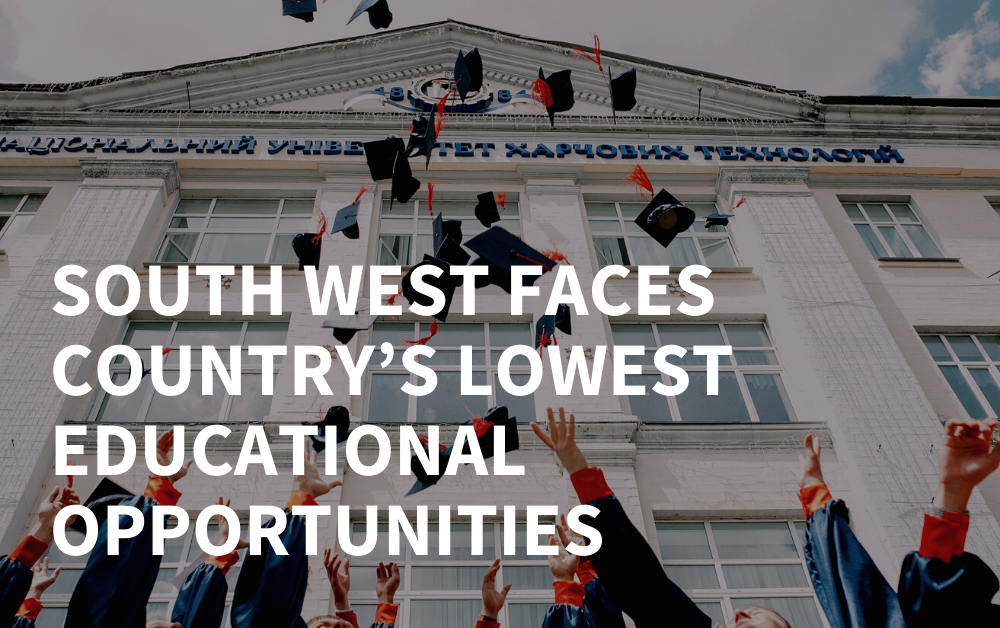A new report by the University of Exeter offers a major contribution to national efforts to improve the skills and education of young people across the country, and highlights the urgent need for levelling up in the South West.
The University of Exeter’s latest report, ‘Social mobility in the South West: Levelling up through education’, addresses the Government’s recent Levelling Up White Paper and its targets to improve education and skills.
The report reveals that the South West (including Devon, Cornwall, and Somerset) has the worst educational outcomes for disadvantaged young people in the country. The region has the lowest rate of disadvantaged students going on to attend university (17 per cent), with only 40 per cent of disadvantaged pupils attaining a passing grade in GCSE English and Maths. The South West also has the largest school attainment gap between poorer pupils and the rest out of all English regions.
The report also reveals that the region has low social mobility compared with other areas, and with fewer professional jobs available and a low return to education, the South West is seeing the highest number of young people leaving the area than any other region.
The report presents three key challenges for the South West:
- A low wage economy, impacting working families and job opportunities for young people
- Disconnected areas, with rural and coastal communities facing barriers to accessing services and education
- A lack of impetus for change, with little national and political advocating on behalf of the region
Dr Anne-Marie Sim, Postdoctoral Research Associate at the University of Exeter and co-author of the report, said: “Ensuring people can live decent lives in the areas in which they are born and grow up is key to raising living standards, retaining talent, and growing the region’s economy without anybody being left behind.
“It is vital that real action is taken to ensure that nobody is left behind as the country ‘levels up’. To do so, government, businesses, and educators must work together to tackle educational barriers and open up opportunities for disadvantaged children and young people in the South West to thrive, throughout their education and into employment.”
To address the barriers facing education and social mobility in the South West, the report sets out four recommendations for national government and regional businesses, focusing on spreading opportunities, improving public services, and empowering local leaders and communities. The report also recommends setting up a dedicated regional body, the South West Social Mobility Commission, to drive forward work to address the barriers outlined in the report’s findings.
The four proposals have been set out to improve educational, job and earnings outcomes for marginalised young people:
- School-centred cradle to career (C2C) models
- A university-led tutoring service
- Sharper focus on disadvantage
- Post-16 skills reform
The researchers were supported by a board comprising of Professor Sir Steve Smith, UK Government International Education Champion, Stephen Dawson, Chair of the Cobalt Trust, Mary Curnock Cook, former Chief Executive of UCAS, Dame Suzi Leather, former Chair of the Charity Commission, Will Harvey, Professor of Leadership at the University of Bristol, Karl Tucker, Chair of the Heart of the South West LEP, and Rachel Wolf, founding partner at Public First.
The report will play a key part of the Heart of the South West LEP’s work on promoting inclusive growth across Devon and Somerset. The LEP works alongside government and local businesses to raise productivity and prosperity, enabling as many people as possible to contribute to, and benefit from, economic growth. The LEP has set out four priorities for the area to promote inclusive growth: more businesses and jobs, futureproof skills, good housing, and good health and wellbeing.
Karl Tucker, Chair of the Heart of the South West LEP, said: “All children and young people should be provided with the opportunity to thrive, but too often those from disadvantaged backgrounds are left behind. As part of the Government’s plan to ‘level up’ the country, it is vital that the South West is supported in evening out the playing field for education, job opportunities, and living standards.
“As part of our goal to raise productivity and ensure prosperity for all through inclusive growth, we look forward to working alongside the University of Exeter, local authorities and businesses in establishing a Social Mobility Commission for the South West, to directly address the barriers highlighted by this report, and improve the lives and prospects of children and young people.”
Read the full report here.


